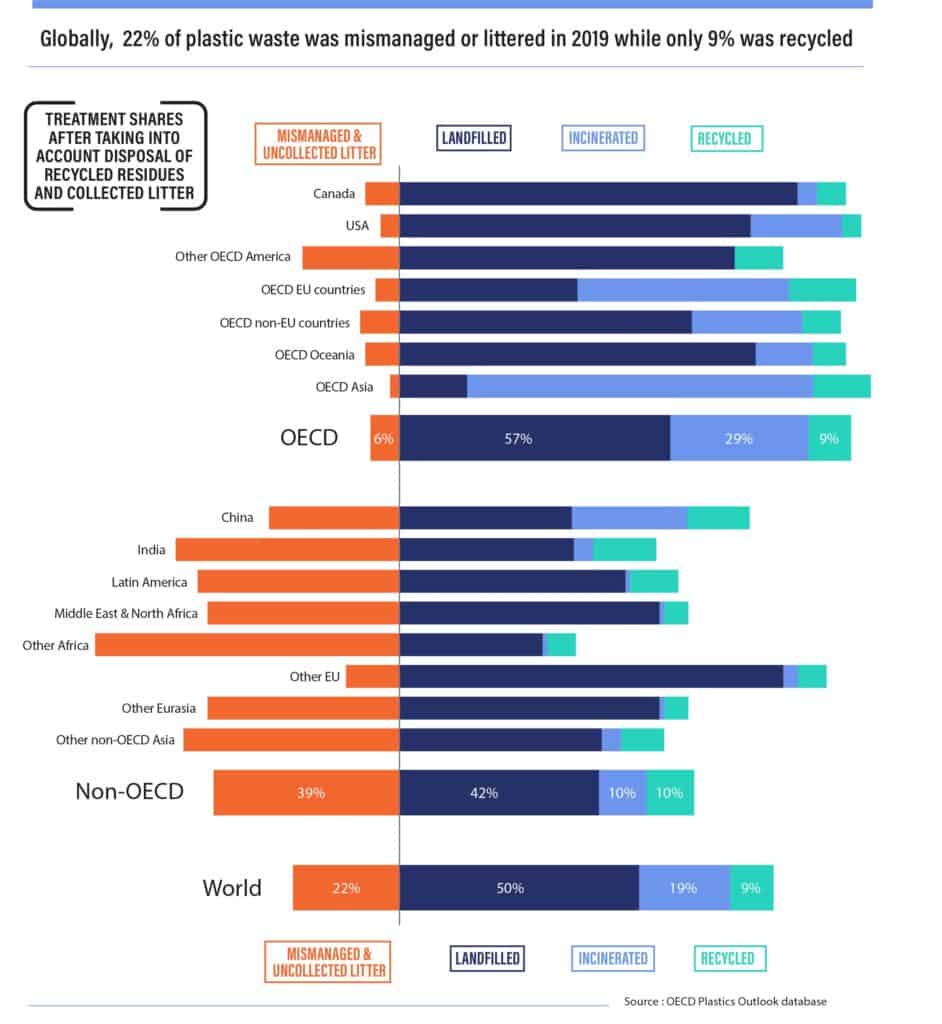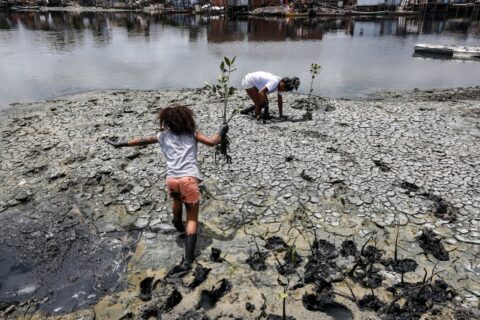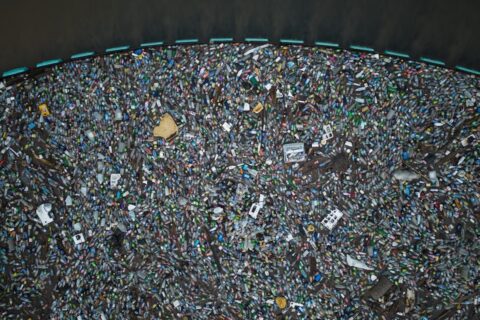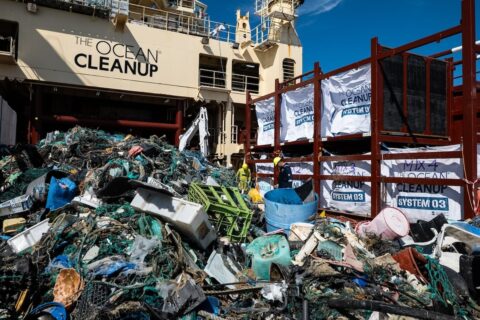
Plastic pollution is on the rise, as waste management and recycling fall short, according to a new OECD report. The world is producing twice as much plastic waste as two decades ago, with the bulk of it ending up in landfill, incinerated or leaking into the environment — only 9% successfully gets recycled.
Ahead of UN talks on international action to reduce plastic waste, the first Global Plastics Outlook to be published by the Organisation for Economic Co-operation and Development (OECD) shows that as rising populations and incomes drive a relentless increase in the amount of plastic being used and thrown away, policies to curb its leakage into the environment are failing to stem the tide.
Regional variations and microplastics leakage
Almost half of all plastic waste is generated in OECD countries, according to the Outlook. Plastic waste generated annually per person varies from 221kg in the United States and 114kg in European OECD countries to 69kg, on average, for Japan and Korea.
Most plastic pollution comes from inadequate collection and disposal of larger plastic debris known as macroplastics, but leakage of microplastics (synthetic polymers smaller than 5mm in diameter) from things like industrial plastic pellets, synthetic textiles, road markings and tyre wear are also a serious concern.
OECD countries are behind 14% of overall plastic leakage. Within that, OECD countries account for 11% of macroplastics leakage and 35% of microplastics leakage. The Outlook notes that international co-operation on reducing plastic pollution should include supporting lower-income countries in developing better waste management infrastructure to reduce their plastic leakage.
Economic recovery, consumption and Covid-19
The report finds that the COVID-19 crisis led to a 2.2% decrease in plastics use in 2020 as economic activity slowed, but a rise in littering, food takeaway packaging and plastic medical equipment such as masks has driven up waste. As economic activity resumed in 2021, plastics consumption has also rebounded.
Reducing pollution from plastics will require action, and international co-operation, to reduce plastic production, including through innovation, better product design and developing environmentally friendly alternatives, as well as efforts to improve waste management and increase recycling.
Bans and taxes on single-use plastics exist in more than 120 countries but are not doing enough to reduce overall pollution. Most regulations are limited to items like plastic bags, which make up a tiny share of plastic waste, and are more effective at reducing littering than curbing plastics consumption.
Landfill and incineration taxes that incentivise recycling only exist in a minority of countries. The Outlook calls for greater use of instruments such as Extended Producer Responsibility schemes for packaging and durables, landfill taxes, deposit-refund and Pay-as-You-Throw systems.
Most plastics in use today are virgin – or primary – plastics, made from crude oil or gas. Global production of plastics from recycled – or secondary – plastics has more than quadrupled from 6.8 million tonnes (Mt) in 2000 to 29.1Mt in 2019, but this is still only 6% of the size of total plastics production.
More needs to be done to create a separate and well-functioning market for recycled plastics, which are still viewed as substitutes for virgin plastic. Setting recycled content targets and investing in improved recycling technologies could help to make secondary markets more competitive and profitable.
Plastic production and waste both doubled in 20 years
Some key findings from the Outlook:
- Plastic consumption has quadrupled over the past 30 years, driven by growth in emerging markets. Global plastics production doubled from 2000 to 2019 to reach 460 million tonnes (Mt). Plastics account for 3.4% of global greenhouse gas emissions.
- Global plastic waste generation more than doubled from 2000 to 2019 to 353Mt. Nearly two-thirds of plastic waste comes from plastics with lifetimes of under five years, with 40% coming from packaging, 12% from consumer goods and 11% from clothing and textiles.
- Only 9% of plastic waste is recycled (15% is collected for recycling but 40% of that is disposed of as residues). Another 19% is incinerated, 50% ends up in landfill and 22% evades waste management systems and goes into uncontrolled dumpsites, is burned in open pits or ends up in terrestrial or aquatic environments, especially in poorer countries.
- In 2019, 6.1Mt of plastic waste leaked into aquatic environments and 1.7Mt flowed into oceans. There is now an estimated 30Mt of plastic waste in seas and oceans, and a further 109Mt has accumulated in rivers. The build-up of plastics in rivers implies that leakage into the ocean will continue for decades to come, even if mismanaged plastic waste could be significantly reduced.
- Considering global value chains and trade in plastics, aligning design approaches and the regulation of chemicals will be key to improving the circularity of plastics. An international approach to waste management should lead to all available sources of financing, including development aid, being mobilised to help low and middle-income countries meet estimated costs of €25bn a year to improve waste management infrastructure.
OECD Member countries and Convention
The 38 Member countries of the OECD span the globe, from North and South America to Europe and Asia-Pacific. They are represented by ambassadors at the OECD Council, which defines and oversees the work of the Organisation, as set out in the OECD Convention.
Member countries engage with OECD experts, use its data and analysis to inform policy decisions, plus play a key role in the Organisation’s country reviews, which are designed to encourage better performances. The European Commission participates in this work, but does not have the right to vote.
Further Reading:
- More on OECD, in general; plus its work on plastics, in particular;
- Read Global Plastics Outlook full report; Executive Summary; or Policy Highlights;
- Watch webinar presentation and discussion of key report findings in Green Talks LIVE;
- Visit OECD library page for further options to download and read report and contents;
- Access Global Plastics Outlook Database and datasets;
- Also on SustMeme, Innovation call to tackle problem of plastic packaging in Africa;
- Also on SustMeme, FMCG and retail giants back £1M fund for flexible plastic recycling;
- Also on SustMeme, Packaging Tax: ‘Future of Plastics’ in The Times;
- Also on SustMeme, Half million people petition Amazon to offer plastic-free packaging;
- Also on SustMeme, No leaders, only laggards, as companies fail to fix plastic pollution;
- Also on SustMeme, Divestment: Are meat and plastic the new coal?
>>> Do you have sustainability news to broadcast and share? If you would like to see it featured here on SustMeme, please use these Contact details to get in touch and send us your Press Release for editorial consideration. Thanks.






